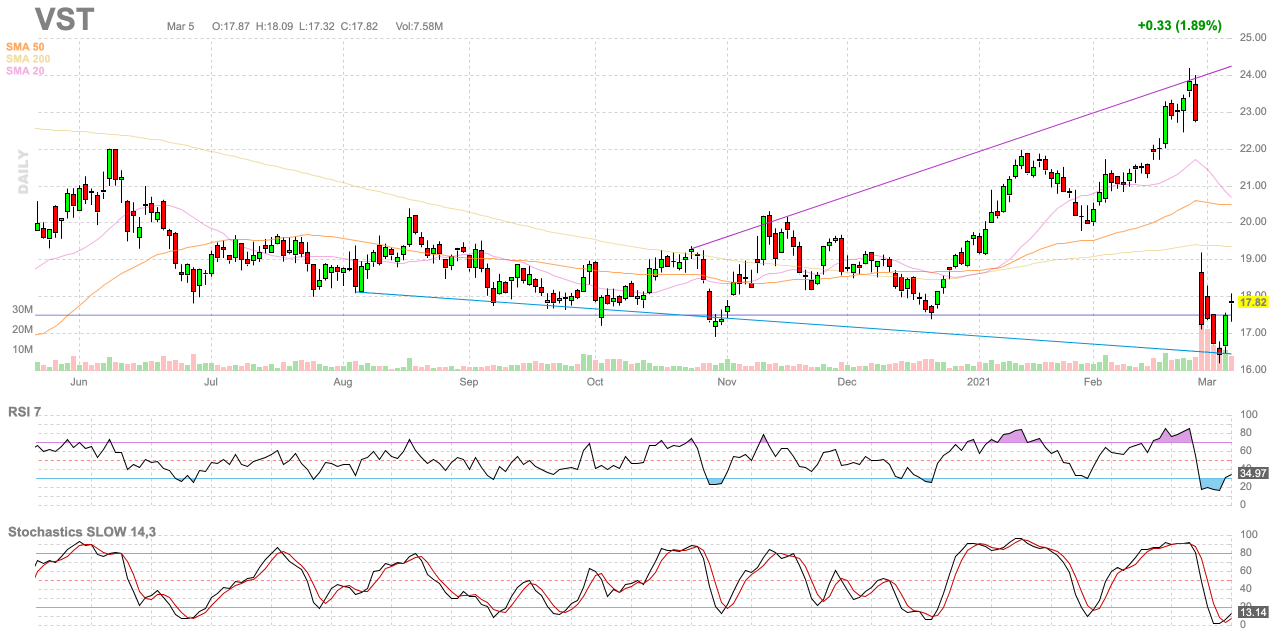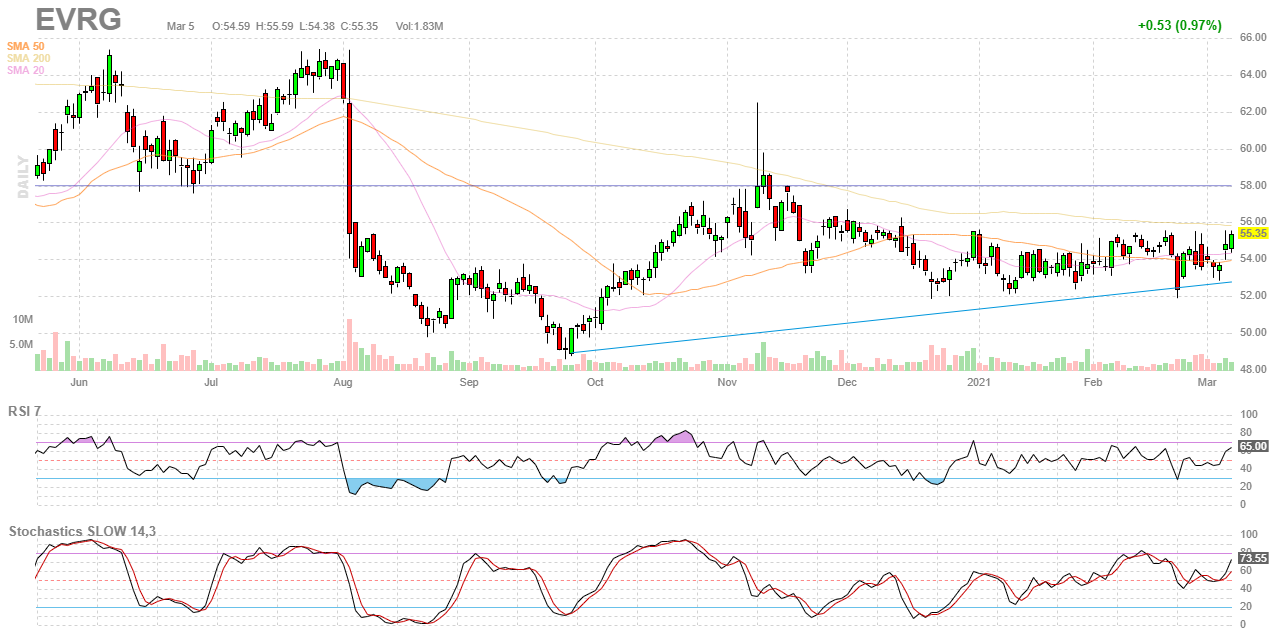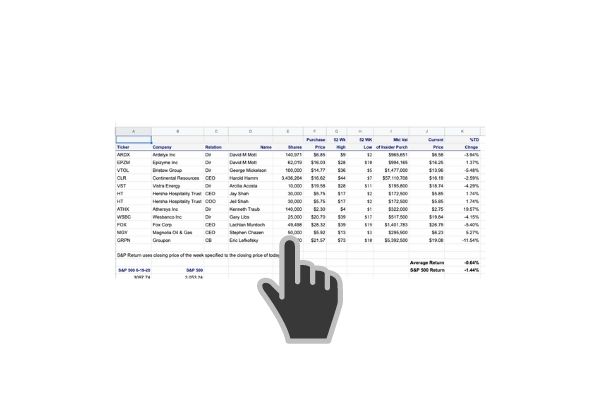For trade details click on this link to the trades
insider-trading/1415404.htm”>EchoStar CORP up 13.60%
Vistra Corp. up 8.53%
EXXON MOBIL CORP up 8.30% * Multiple Buys
TELEDYNE TECHNOLOGIES INC up 8.30% * Multiple Buys
Cortexyme Inc. up 7.50%
Vistra Corp. up 7.15%
IRONWOOD PHARMACEUTICALS INC up 9.44%
TELEDYNE TECHNOLOGIES INC up 7.08%
Hanesbrands Inc. up 6.84%
Primo Water Corp up 5.39% * Multiple Buys
Evergy Inc. up 4.34% Multiple Buys
Wayfair Inc. up 4.229%
ENERGY INC"}” data-sheets-userformat=”{"2":8193,"3":{"1":0},"16":8}” data-sheets-hyperlink=”https://www.secform4.com/insider-trading/1130310.htm”>CENTERPOINT ENERGY INC up 4.13% Multiple Buys
iHeartMedia Inc. up 2.94%
AGREE REALTY CORP up 2.77% Multiple Buys
FLEXSTEEL INDUSTRIES INC up 2.11%
ENTERPRISE PRODUCTS PARTNERS L.P. up 1.98%
DENTSPLY SIRONA Inc. up 1.78%
Keurig Dr Pepper Inc. up 1.78% * Multiple Buys
CHURCH & DWIGHT CO INC up 1.70%
Kennedy-Wilson Holdings Inc. up 1.70%
CARRIAGE SERVICES INC up 0.93%
DOMINION ENERGY INC up 0.62% * Multiple Buys
Univar Solutions Inc. up 0.49%
MACK CALI REALTY CORP up 0.48%
ESSA Pharma Inc. up 0.22%
RAYONIER INC up 0.15%
CACI INTERNATIONAL INC -0.47%
LOWES COMPANIES INC -0.56%
Avangrid Inc. -0.97%
Biohaven Pharmaceutical Holding Co Ltd. -1.30%
DANAHER CORP -1.44%
Macy’s Inc. -1.50%
SLR Investment Corp. -1.81% * Multiple Buys
Freshpet Inc. -2.55%
CROWN CASTLE INTERNATIONAL CORP -5.03%
AMEDISYS INC -6.99%
Editas Medicine Inc. -10.03%
LendingTree Inc. -13.10%
vTv Therapeutics Inc. -14.69%

When insiders concentrate their buying a specific sector of the Company, this is usually a seminal event for investors. On the surface, it probably reflects that stock prices are down but it also indicates a major opportunity for patient investors. We are seeing this kind of buying now in the utility sector. Electric vehicle charging is a red hot investment sector, solar is a hot sector, renewables are a hot sector but utilities who have quasi-monopoly positions in all of these areas are market laggards. Insiders are buying and so are we.
Barron’s Andrew Barry hinted at this in his piece last week in Barron’s entitled 12 Stocks and Fund to Play the Coming Green Boon for Utilities. He writes, ” electric utilities are at the center of a seismic shift away from coal and toward wind and solar power over the next 15 years. That is expected to be a huge boon to both the environment and investors—and utility company stocks and funds are a cheap way to plug into this critically important transition.”
The reason prices are down is clear. Rising interest rates have spoked interest-rate-sensitive groups like utilities and real estate investment trusts. I’m not sure insiders have got it right on REITs but utilities may offer special opportunities for investors with minimal risk as well. While investors are focused rightfully so on renewables and the electrification of the transportation industry, the whole country’s utility grid will have to be reimagined to support this future. It’s myopic if not downright naive to not think that U.S. utilities will not play a big role in this. We tripled our investment last year catching the Chargepoint run and during our due diligence, we can upon an epiphany of sorts. Chargepoint, the industry leader, was suing Duke so they could compete in the electric car industry against a monopoly electric company.
Barry writes in Barrons that, “Many investors are overlooking this bright green opportunity. The $500 billion utility sector has badly trailed the overall stock market of late. The largest exchange-traded fund of utility stocks, the Utilities Select Sector SPDR (ticker: XLU), returned negative 10% in the past year compared with a 24% return for the S&P 500 index. ”
That underperformance could be about to change as investors take note of this insider buying, if it picks up, and continues.

CFO Burke bought 30,000 shares at $16.50 as VST plummeted on the Company’s disclosure of a negative $900M-$1.3B potential impact from the Texas’ severe weather event. BofA put a price target of $20 while Credit Suisse analysts lowered his buy recommendation from $30 to $25 according to Fly on the Wall.Several utility company officers and directors are buying this group now. We pay special attention to buying across a whole sector as this is classic contrarian buying and not company specific. Vistra Corp is an exception, though. While most utilities are selling off because of rising rates, Vistra is a Texas-based utility that got whacked by the recent Texas Winter freeze and energy debacle. Insiders have been steadily buying this company all year and it’s good to see they are continuing the trend. We’d be buyers and will grab some VST but have to be careful about what you pay for this sector. Don’t chase prices up, instead nibble on the way down. Low rates are here to stay and this is your classic false positive when everyone is saying rates are going up. Low rates have more to do with declining birth rates and an aging population. Look at Japan. Inflation is more often than not ignited by a freakish event, like the Arab oil embargo of the ’70s or the
Vistra is the largest competitive residential electricity provider in the country and offers over 50 renewable energy plans. The company is also the largest competitive power generator in the U.S. with a capacity of approximately 39,000 megawatts powered by a diverse portfolio, including natural gas, nuclear, solar, and battery energy storage facilities. In addition, the company is a large purchaser of wind power. The company is currently constructing a 400-MW/1,600-MWh battery energy storage system in Moss Landing, California, which will be the largest of its kind in the world when it comes online.

Evergy CEO David Campbell stepped up and bought 10,000 shares of EVRG at $52.92. We’re seeing a lot of utility company insiders buying. CFO Andrews also bought 10,000 shares at $53.48 Evergy is an American investor-owned utility with publicly traded stock that has its headquarters in Topeka, Kansas, and in Kansas City, Missouri. The company was formed from a merger of Westar Energy of Topeka and Great Plains Energy of Kansas City, Missouri, parent company of Kansas City Power & Light. Wikipedia
Shares of Evergy dropped in August after the company decided to remain independent after talking to potential buyers. Under pressure from activist Elliott Management, Evergy reached out to several potential suitors but decided there was more value to be created through the implementation of a new operating plan. Now insiders are buying and we would as well. The entire utility industry will undergo a tremendous transformation over the next decade as the nation transitions to electric vehicles from combustion engines. Renewable and clean energy will turn this stodgy industry into a hot growth story. Evergy says on their website that nearly half of the power they provide to homes and businesses is emissions-free. Evergy pays 3.87% while you wait for the renewable revolution.
Two directors from Centerpoint Energy bought stock. Director Biddle bought 50,000 shares of CNP at $19.80. Director Smitherman purchased 10,000 shares at $19.80. Centerpoint yields 3.10%. CNP recently raised guidance and announced a 6-8% growth rate. They appear to have weathered the Texas freak winter storm without the damage Vista announced. This $1million dollar buy by CenterPoint director Biddle should comfort any anxieties investors might have about Centerpoint’s 57% investment ownership of Enable Midstream’s merger with Energy Transfer Partners. Energy, Inc. is an American Fortune 500 electric and natural gas utility serving several markets in the American states of Arkansas, Indiana, Louisiana, Minnesota, Mississippi, Oklahoma, and Texas. It was formerly known as Reliant Energy, NorAm Energy, Houston Industries, and HL&P. Wikipedia
Dominion Energy Inc CEO Robert Blue bought $1million worth of stock at $69.43. He was accompanied by Director Kington who bought 2000 at $68.29. Blue is the recently appointed CEO of Dominion, taking on the role in October. I would feel a lot better about the purchases of D if the retiring CEO and now Executive Chairman, Robert Farrell wasn’t continually selling his shares under a 10b5-1 plan. I can understand though that when you have over 1 million shares like Farrell has accumulated, you might want to start diversifying your estate planning. What’s most curious though is how a CEO of a regulated public utility can be paid so handsomely. Dominion pays a dividend of 3.61% Dominion has big stakes in a number of renewable ventures including wind and solar.
Dominion is a stark reminder that dividends can be cut or even lost altogether in the utility sector. For utilities, especially ones with regulated businesses like electricity transmission, dividend cuts are rare—even in challenging times like those brought on by Covid-19. The company, based in Richmond, Va., cut its payout November after getting overextended as a result of acquired various natural-gas pipelines and storage facilities as part of its growth strategy. Berkshire Hathaway scooped in ab bought the majority of Dominion’s gas pipelines and storage business and a 25% stage in Cove Point, an east coast LNG export terminal that Dominion has been working on for years.
Avangrid Director Arriola bought 25,000 shares at $46.53. AVANGRID, Inc. AVANGRID, Inc. (NYSE: AGR) is a leading, sustainable energy company with $38 billion in assets and operations in 24 U.S. states. AVANGRID has two primary lines of business: Avangrid Networks and Avangrid Renewables. Avangrid Networks owns eight electric and natural gas utilities, serving 3.3 million customers in New York and New England. Avangrid Renewables owns and operates a portfolio of renewable energy generation facilities across the United States. AVANGRID employs approximately 7,000 people. AVANGRID is part of the IBERDROLA Group. IBERDROLA, S.A. is an energy pioneer with one of the largest renewable asset bases of any company in the world
CSO and President Johnson bought 20,000 shares of EchoStar Corp at $23.45. EchoStar Corporation (NASDAQ: SATS) is a premier global provider of satellite communication solutions. Headquartered in Englewood, Colo., and conducting business around the globe, EchoStar is a pioneer in secure communications technologies through its Hughes Network Systems and EchoStar Satellite Services business segments. If you’re confused about the difference between EchoStar and Dish Network, join the club. They are both Charlie Ergan’s brainchild and were once under the same hood. Now Dish is a separate company which includes the Dish Network, Sling TV, and set-top business. EchoStar is more of a broadband backbone provider. Neither one are very long-term attractive to me. I have no idea why Johson stepped up and bought shares but he was quickly rewarded for it.
Jeffrey Ubben, the powerful ex-manager of Value Act Fund supposedly left ValueAct to start a socially responsible fund, Inclusive Capital Partners. His most high-profile act to date was to accumulate a large amount of Exxon and get himself appointed to the board. Somehow in the mix of things he winds up buying just under $10 million in the name of Inclusive Capital Partners. I wouldn’t put much credence on this except Director Angelakis bought 25,000 at $57.16. He is a professional investor. Normally we like to see officers and directors that are putting their own money at risk, more than just their investment partners. This is a little of both. To be clear we much prefer the buys back in March when two VPs were buying at XOM at $33.80 and $36.41.
Last week we noted that prominent biotech investor Alexander Denner bought shares in Ironwood Pharmaceuticals. He was back at it again this last week purchasing another 1,350,000 shares for his hedge fund, Sarissa Capital. This is a very informed insider so pay special attention to this one.
Chairman Mehrabian purchased 10,000 shares of Teledyne Technologies at $361.54. VP VanWees bought 3000 shares at $357.48. These are both meaningful buys. Mehrabian is the esteemed executive Chairman and former President of Carnegie Mellon. He is an esteemed scientist with a doctorate in science from MIT. He has served on the board of several public companies. He led TDY from 2000 to 2018. Teledyne is a conglomerate with hundreds of businesses mostly concentrated in Instrumentation, Digital Imaging, Aerospace, and Defense Electronics, and Engineered Systems.
Two directors and the CEO of Primo Water Corp purchased shares in this bottled water distributor. CEO Harrington purchased 15,280 shares of PRMW at $14.48. You might recognize PRIMO from their 2017 purchase of Glacier Water, the national leader in providing self-service refill water. Honestly, we don’t get these buys at all. More often than not, when we don’t get it, the management proves right and the stock will work.
Insiders are also buying REITs but this one is a harder sell to us. Office buildings and retail shopping are in secular decline. Anything can go too far so we are watching the sector more closely after several insiders bought shares in Agree Realty.
Follow us on Twitter for real time insider buying alerts at https://twitter.com/theinsidersfund
[custom-twitter-feeds]
Insiders sell stock for many reasons, but they generally buy for just one – to make money. You’ve always heard the best information is inside information. Everyone who has any experience at all in the stock market pays close attention to what insiders are doing. After all, who knows a business better than the people running it? Officers, directors, and 10% owners are required to inform the public through a Form 4 Filing any transaction, buy, sell, exercise, or any other with 48 hours of doing so. This info is available for free from the SEC’s Web site, Edgar, although we subscribe to SECForm4 as they provide a way to manage and make sense of the vast realms of data. I’ve tried a lot of vendors and SECForm4 is one of the most customer-friendly and responsive I’ve used.
We publish a subscription newsletter called The Insiders Report. We offer a free 30-day trial so you have nothing to lose by trying it out. Be sure to carefully read the TERMS OF SERVICE.
Another source for insider buying and selling and much more is FinViz Elite. FinViz stands for financial visualization and they do an amazing job of providing reams of data and the tools to help you get to the bottom of it, the information that helps me make informed decisions and probable outcomes. I’ve been using their site for years and it only gets better over time.
This is as close to “insider information” that an ordinary investor is likely to see- and it’s entirely legal.
BEWARE– Following insiders can be hazardous to your financial health unless you know what you are doing. Unlike the raw, unfiltered data, The Insiders Fund blog informs you of the purchases that count, the ones that are just window dressing into deceiving the public that all is hunky-dory, and those that are just flat out other people’s money and should be just discarded like bad fish. As a rule, we only look at material amounts of money, $200 thousand or more, as anything less could just be window dressing.
The bar is different from selling because the natural state of management is to be sellers. This is because most companies provide significant amounts of management compensation packages as stock and options. Therefore, with selling, we analyze for unusual patterns, such as insiders selling 25 percent or more of their holdings or multiple insiders selling near 52-week lows. Another red flag is large planned sale programs that start without warning. Unfortunately, the public information disclosure requirements about these programs referred to as Rule 10b5-1 is horrendously poor. Also planned sales that just pop up out of nowhere are basically sales and are seeking cover under the Sarbanes Oxley corporate welfare clause. I also generally ignore 10 percent shareholders as they tend to be OPM (other people’s money) and perhaps not the smart money we are trying to read the tea leaves on.
Of course, insiders can also be wrong about their Company’s prospects. Don’t let anyone fool you into believing they never make mistakes. No one tracks and understands insider behavior better than us. We’ve been doing it religiously since 2001 when I quit being an insider myself and devoted myself full time to managing my personal investments. They can easily be wrong about how much others will value them, and in many cases, maybe most cases have no more idea what the future may hold than you or I. In short, you can lose money following them. We have and we curse aloud, what were they thinking! Needless to say, past good fortune is no guarantee of future success. We may own positions, long or short, in any of these names and are under no obligation to disclose that. We welcome your comments on our analysis.
This blog is solely for educational purposes and the author’s own amusement. Investing with The Insiders Fund is for qualified investors and by Prospectus only. Nothing herein should be construed otherwise. THE INSIDERS FUND invests in companies at or near prices that management has been willing to invest significant amounts of their own money in. If you would like to hear more about how you can get involved with the Insiders Fund, please schedule some time on my calendar.
Prosperous Trading,
Harvey Sax
The Insiders Fund was the 4th best long-short equity fund in the world in 2019



[…] Denner was back at it again buying $2.33 million of Ironwood Pharmaceuticals. We blogged about this last week. Sarissa Capital is a hedge fund with medical doctors and Ph.D.’s as analysts. They know what […]